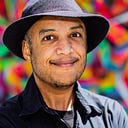Member-only story
Two Months in Lockdown
Staying sane in San Francisco
On March 16, 2020, the San Francisco Department of Public Health issued their first stay-at-home order of the Coronavirus pandemic. That same day, I began telecommuting, an arrangement our San Francisco office staff had worked out the previous week. I did not realize at the time that I’d still be working from home two months later, but I have been managing reasonably well under the circumstances.
In many ways, my temperament was ideally suited for home isolation. I had become increasingly introverted and anxious being in public since beginning my gender transition in 2013, often not leaving home for days at a time. I did some volunteer work and made a little money from writing and photography, but was reluctant to return to a full-time day job, which I hadn’t held in many years.
I was fortunate to get a part-time internship with the Office of Transgender Initiatives, which I started just after New Year’s. I enjoyed the work itself but not the commute, even though it was just over two miles from my apartment. With a combination of walking and public transit, I weaved my way around perpetual construction projects and people in various states of distress, and endured passengers blaring loud music and otherwise behaving badly on the bus.
